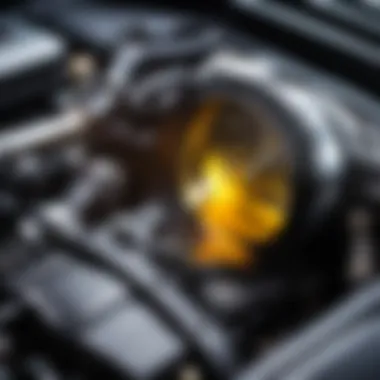Understanding Oil Smells in Your Car Interior


Intro
Experiencing an oil smell inside your car can be concerning for any driver. It not only signals potential mechanical issues but also raises questions about cabin safety and comfort. Whether you are a car enthusiast or an everyday driver, understanding these odors is crucial. The aim of this article is to dissect the causes linked to oil smells in vehicle interiors and provide practical solutions for addressing them.
We will cover how oil leaks can stem from various sources, including the engine, cabin fixtures, and even the air conditioning system. Alongside identifying problems, we will dive into methods for prevention and maintenance that can help keep the driving experience pleasant. Knowing how to diagnose these issues can ultimately influence your vehicle's health and longevity.
Обзор автомобиля
Understanding your vehicle's characteristics can aid in grasping why oil smells might arise in the first place. By examining engine types and transmission systems, we can better understand the source of possible leaks.
Основные характеристики
Every car model has unique features related to its engine size, type, and transmission. These influence not just performance but also the mechanics of how oil circulates and is maintained within the car. Generally, a well-maintained car is less likely to develop oil-related odors.
Описание двигателей и трансмиссий
Most vehicles run on either gasoline or diesel engines, with each having its own common issues tied to oil. The engines are equipped with oil pumps that ensure proper circulation. If these pumps fail or if there are leaks in the system, oil can spill into areas where it shouldn't be.
Furthermore, the type of transmission contributes as well. Some vehicles use automatic transmissions that require specific oil types. Improper care in these areas could exacerbate spills and odors. Understanding these dynamics is important for car owners who want to prevent stinky surprises in their interiors.
Causes of Oil Smell
Finding the source of the oil smell involves considering multiple factors. Key contributors include:
- Engine leaks: Typically occur where seals and gaskets wear out.
- Oil filter issues: If filters are not functioning, this can result in leaks.
- Cabin air filter contamination: Oil can find its way into the cabin through an ineffective air filter.
- Air conditioning system: Occasionally, an oil smell can occur when the AC unit is malfunctioning.
Diagnosing these issues can require a careful inspection, possibly with the assistance of a professional mechanic.
Solutions and Preventive Measures
Addressing the problem can be multifaceted. Implementing regular maintenance programs can prevent many issues that lead to oil odors.
Some preventive steps include:
- Routine inspections: Checking for possible leaks or faulty gaskets
- Replacement of worn components: Ensuring seals, filters, and other parts are in good condition can reduce risks
- Using the right oil: Different engines need specific oil types for optimal performance
An oil smell should not be ignored. It could signify serious underlying issues that might affect your vehicle’s performance.
"Preventing oil smell in the car interior involves awareness and timely action."
Foreword to Oil Smell in Cars
The presence of an oil smell in your car's interior is often a matter of concern among vehicle owners. This odor can signal more than just an unpleasant atmosphere; it often points to underlying issues that need to be addressed promptly. Identifying and understanding the source of these odors is essential not only for comfort but also for safety.
Defining the Problem
Oil smells within a vehicle can emanate from various causes. Often, the source is mechanical, indicating an oil leak or similar problem in the engine or other systems. Typical culprits may include leaking engine oil, transmission fluid, or even coolant. Each potential source not only brings its own distinct smell but also varies in terms of urgency for repair.


A persistent oil odor should not be dismissed as a minor inconvenience. Ignoring this issue could lead to more significant mechanical failures over time. Moreover, if unaddressed, these leaks can diminish the overall efficiency of the vehicle, affecting performance and longevity. Therefore, recognizing this problem early on is paramount to maintain a safe driving environment.
Importance of Addressing Oil Odors
Tackling the issue of oil smells is essential for multiple reasons. Healthwise, prolonged exposure to oil fumes can be detrimental. Although the smell may be faint, consistent inhalation of volatile compounds in oils can lead to respiratory problems over time. Additionally, the comfort of driving can be compromised by disagreeable odors, making any long-duration trip unenjoyable.
From a mechanical perspective, addressing oil smells can prevent larger, more expensive problems. A small leak can evolve into a significant issue if it leads to engine damage or other system failures. Most importantly, actively managing and resolving these odors serves as a proactive approach to vehicle maintenance, which in turn ensures better performance and possibly extends the lifespan of the vehicle.
"A small oil leak today can lead to major repairs tomorrow."
Common Causes of Oil Smell in Car Interiors
Understanding the common sources of oil smell in car interiors is crucial for vehicle owners. This knowledge helps in the early identification of issues that could lead to more significant problems. Oil odors in a vehicle may not be just a nuisance; they often signal potential mechanical failures. Addressing these smells promptly can prevent costly repairs and maintain overall vehicle performance.
Engine Oil Leaks
Engine oil leaks are one of the primary culprits behind oil odors inside a car. These leaks can occur due to wear and tear on gaskets or seals within the engine compartment. When engine oil escapes, it often makes contact with hot engine components. This contact can lead to burning oil, creating the unpleasant smell that may penetrate the interior of your vehicle. It’s important to periodically check for oil spots under the car, which could indicate a leak. If detected, timely repairs should be made to avoid engine damage.
Transmission Fluid Leaks
Transmission fluid leaking can also cause a distinct smell. The fluid is typically bright red in color and has a sweet or burning odor. Similar to engine oil, it can leak from seals and gaskets that wear over time. Not only does this create a foul smell, but it can also impact transmission performance. Regular checks of fluid levels can help in early identification. If anyone notices a drop in performance or unusual smells, it’s advised to consult a mechanic since transmission issues can be severe if neglected.
Oil Filter Issues
Oil filter problems can lead to oil leaks in a vehicle. A faulty oil filter may not seal properly, leading to oil seepage. This seepage not only results in an oil smell inside the cabin, but it can also cause the engine to lose oil pressure. It is vital to ensure that the oil filter is changed during regular maintenance checks as recommended by the manufacturer. Ignoring this can lead to a cascade of mechanical failures.
Faulty Seals and Gaskets
Various seals and gaskets are used throughout a vehicle to prevent oil leaks. Over time, these components can degrade, leading to leaks. Common locations for leaks include the valve cover gasket and oil pan gaskets. A failed seal may allow oil to leak onto hot engine parts, creating a burning smell. Regular inspections of these components can help mitigate issues before they become serious problems. Drivers should stay vigilant for any signs of oil collecting in undesired areas.
Heater Core Problems
A malfunctioning heater core can also be responsible for oil odors in the cabin. The heater core is tasked with providing warmth using engine coolant. If there is a leak in the heater core, it may create a smell similar to burnt oil. This issue can be further tested by checking the cabin for signs of coolant leaks, like a sticky residue. If the heater core is indeed leaking, it generally requires professional intervention to ensure safe driving conditions.
How to Identify the Source of Oil Smell
Identifying the source of an oil smell in your car interior is critical. This process can help pinpoint not only the cause but also recommend appropriate actions. Knowing where the odor originates can save time and resources, potential damage, and increase safety while driving. More importantly, you should consider that oil odors can indicate deeper problems within your vehicle that need immediate attention.
Visual Inspections
Visual inspections are a primary step in identifying the source of oil smells.
- Look Under the Hood: Start your inspection by opening the hood and inspecting for any visible leaks. Check around the oil filter, valve covers, and oil pan for signs of oil pooling or streaking.
- Check the Ground: Examine the ground under your vehicle where you commonly park. Puddles or stains may indicate oil leaks from various components.
- Inspect the Cabin: Look within the vehicle, especially if the smell is more pronounced inside. Ensure that hot air is not carrying oil fumes from the engine compartment into the cabin.
This method can provide immediate feedback on obvious leaks, allowing you to resolve them quickly and effectively.
Testing for Leaks


Testing for leaks can involve several methods that confirm the presence of oil in your vehicle. Professional mechanics often use specific techniques, but you can apply basic methods as well.
- Oil Dye: Certain oil leak detection dyes can be added to your oil. They fluoresce under black light, helping you trace any leaks.
- Paper Towel Test: Use a clean paper towel to probe suspects areas, like around the oil filter or drain plug. If oil appears on the towel, you have found a leak.
- Pressure Test: For serious diagnostics, a pressure test can help check the integrity of the oil system, spotting issues that are not visually evident.
Implementing these tests can greatly improve your chances of finding the specific source of the oil smell.
Using Diagnostic Tools
Various diagnostic tools can assist in identifying oil smells and leaks accurately. Some of these tools are particularly effective and can offer detailed insights into your vehicle’s condition.
- OBD-II Scanner: An OBD-II scanner can help identify trouble codes that point to oil system malfunctions. It connects to the car's computer, providing useful data for diagnosis.
- Smoke Test: This tool introduces smoke into the engine system, revealing leaks through visible smoke escaping from compromised seals or gaskets.
- Thermal Imaging Camera: For a more advanced technique, a thermal imaging camera can identify temperature variations that may indicate leaks or overheated components.
Utilizing these tools not only helps in locating the odor's source but can also assist in maintaining overall vehicle health. Knowing how to properly implement these methods can lead to quicker and more effective solutions to the oil smell in your car.
Potential Implications of Persistent Oil Odor
Addressing the presence of oil smell in your car interior is essential. Ignoring it can lead to various implications, affecting not only comfort but also safety and vehicle functionality. Understanding these implications enables car owners to act promptly, preserving both their health and the vehicle's integrity.
Health Risks of Oil Exposure
Exposure to engine oil can pose significant health risks. The volatile compounds in oil, when inhaled, may lead to respiratory issues like irritation of the throat or lungs. Long-term exposure can increase the risk of more serious health problems, including:
- Chemical Burns: Oil spills in the cabin can cause skin irritation and burns upon contact.
- Respiratory Issues: Breathing in fumes can exacerbate asthma or lead to chronic respiratory conditions.
- Toxic Exposure: Some oils contain additives that can be harmful if inhaled over prolonged periods.
To mitigate these risks, it is vital to identify and address any leaks or smells promptly. Maintaining a clean and safe car interior is a responsibility that should not be overlooked.
"Preventive measures are crucial to ensure a healthy driving environment and protect passengers from potential harm."
Impact on Vehicle Performance
The odor of oil can be a symptom of underlying mechanical issues that impair vehicle performance. Persistent oil leaks may lead to critical problems such as:
- Engine Damage: Insufficient oil due to leaks can result in severe engine wear or failure. The engine relies on oil for lubrication, and without it, parts can grind together, creating friction and heat that damage components.
- Transmission Failure: A transmission fluid leak can result in slipping gears or difficulty shifting, ultimately leading to a need for costly repairs or replacements.
- Decreased Fuel Efficiency: When the engine is not operating correctly, it may consume more fuel, increasing overall cost for the driver.
Immediate attention to oil smells can prevent larger, more expensive problems down the line. Regular checks and maintenance play a vital role in keeping the vehicle in optimal condition, ensuring safety and efficiency for all passengers.
Preventive Measures to Avoid Oil Smell
Preventive measures are essential for maintaining a vehicle's overall health and ensuring that unpleasant oloors do not infiltrate the car's interior. By implementing strategies to avoid oil smell, vehicle owners can not only enhance their driving experience but also prolong the life of their car.
Regular Maintenance Checks
Regular maintenance checks are crucial in preventing oil smells in car interiors. Consistent servicing allows for the early detection of any potential issues, including leaks or worn components.
During a maintenance visit, mechanics can inspect vital systems like the engine, transmission, and oil pathways. They will check for signs of leaks or possible oil accumulation in areas prone to odor. It is advisable to follow a routine maintenance schedule recommended by manufacturers, typically including inspections every 5,000 to 7,500 miles.
Key elements to watch for during checks:


- Condition of engine oil
- Integrity of gaskets and seals
- Fluid levels in both engine and transmission
- Signs of wear on the oil filter
Immediate Repairs of Leaks
Promptly addressing leaks is crucial for minimizing oil smells. When drivers notice any oil residue under the car or a persistent smell inside the cabin, it is essential to investigate the source immediately. Delaying repairs can lead to more significant problems, compounding costs and risks.
Repairs may include:
- Replacing damaged seals or gaskets
- Fixing oil filter issues
- Repairing any visible oil leaks from the engine or transmission
Taking swift action stops the problem from escalating and helps maintain a clean and odor-free environment.
Choosing Quality Engine Oils
The type of engine oil used can greatly affect the overall performance of the car and the presence of odors in the interior. Selecting high-quality engine oils is essential for minimizing unwanted smells. Quality oils often contain additives that reduce the likelihood of leaks and burns, which can contribute to odors.
When choosing engine oil, consider:
- Checking viscosity ratings compatible with your car model
- Opting for synthetic oil, known for its higher resistance to breakdown and leakage
- Reading product reviews and specifications to ensure reliability
Using quality engine oils not only helps in managing oil smells but also enhances engine performance, providing a smoother driving experience.
Regular maintenance and timely repairs are key. Ignoring minor issues can lead to larger problems down the line.
In summary, incorporating regular checks, addressing leaks promptly, and choosing quality products can drastically reduce the likelihood of oil smells invading the car interior. Such preventive measures are a smart approach to automotive care, allowing for a more enjoyable and safe driving experience.
When to Seek Professional Help
Understanding when to seek professional help for an oil smell in your car is critical. Some car issues can appear minor but may indicate deeper mechanical failures. Ignoring these signals not only risks further damage to your vehicle but also poses potential safety hazards.
Signs Indicating Serious Issues
Several signs may suggest that the oil odor in your car is a symptom of a more serious problem. First, persistent or worsening odors can be alarming. If the smell does not dissipate after basic maintenance efforts, it is best to consult a professional. Other indications might include:
- Frequent engine overheating: If your engine temperature gauge shows consistent high readings, it may signal cooling fluid leaks or oil issues.
- Visible fluid leaks: Puddles of oil or other fluids underneath your car are clear signs something is wrong. This may indicate failing gaskets or seals that require immediate inspection.
- Smoke or burning smells: A burning smell, often associated with oil fumes, can indicate that oil is leaking onto hot engine parts. This issue should not be taken lightly.
- Dashboard warning lights: Any warning lights on your dashboard, particularly those related to oil pressure or engine performance, necessitate prompt attention.
Understanding Professional Diagnostics
Professional diagnostics involve more than just checking for leaks. Mechanics use a variety of tools and techniques to identify the root cause of an oil smell. Understanding these methods can help you appreciate the need for expert intervention. Common diagnostic approaches include:
- Electronic scanning tools: These devices read error codes from the car’s onboard computer, helping to pinpoint specific malfunctions.
- Fluid analysis: Mechanics may analyze engine oil or other fluids to determine contamination levels or other issues that could contribute to smells.
- Pressure tests: These tests can identify leaks in critical areas, like the engine or transmission, which may not be easily visible.
Professional help is essential not only for the resolution of this issue but also for maintaining your vehicle's overall health. Ignoring persistent oil odors can lead to larger repair bills in the future.
Epilogue
Understanding the causes and solutions for oil smell in car interiors is significant for various reasons. It highlights the relevance of prompt action when detecting this issue. Ignoring such odors can lead to serious problems, from health risks to performance decreases in your vehicle. Addressing these smells comprehensively promotes safety and comfort while driving.
Recap of Key Points
- Oil smells can arise from several sources, which include engine oil leaks, transmission fluid leaks, and oil filter issues.
- Identifying the exact source of the smell is critical through visual inspections, testing for leaks, and using diagnostic tools.
- Persistent oil odors can lead to health risks and impair overall vehicle performance.
- Preventive measures, such as regular maintenance checks and immediate repairs of leaks, keep your vehicle in optimal condition.
- Knowing when to seek professional help can save money and prevent long-term damage.
Final Thoughts on Vehicle Maintenance
Regular vehicle maintenance is essential. Not only does it help to manage smells, but it also extends the life of your car. Addressing issues as they arise prevents them from turning into significant problems. Vehicle owners must take an active role in maintaining their cars. This includes being mindful of any unusual smells and seeking help if necessary. Ensuring the vehicle's health ultimately enhances the driving experience and promotes safety on the road.







